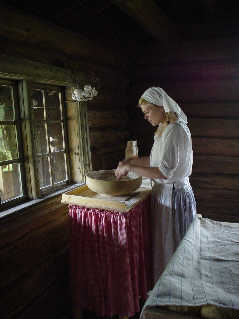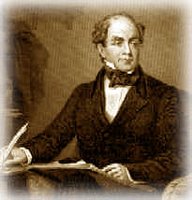In case you haven't heard, today, October 31, is Reformation Day. It's the anniversary of the day in 1517 when Martin Luther nailed his
95 Theses to the door of the church in Wittenberg, and a day for Protestants to remember the Reformation. I'm going to mark the day by posting a reflection on one of the slogans of the Reformation:
Solus Christus, or
by Christ alone. This little phrase refers to the truth that our salvation is accomplished by Christ's work and nothing else. It only seems right--doesn't it?--that I should ground this reflection in scripture, since another of the slogans of the Reformation is
Sola Scriptura, which points to the supreme authority of scripture in the life of the church and the life of the believer.
Therefore since we have a great high priest who has passed through the heavens, Jesus the Son of God, let us hold fast to our confession. For we do not have a high priest incapable of sympathizing with our weaknesses, but one who has been tempted in every way just as we are, yet without sin. Therefore let us confidently approach the throne of grace to receive mercy and find grace whenever we need help. (Hebrews 4:14-16 NET)
This bit of scripture tells us that believers have direct access to God, for not only is there is no longer a barrier that keeps us from approaching him, there is a conduit for us to approach him through. This place of bold standing before God and free approach to him comes to us through the work of Christ: through his historical reconciling work on the cross; and, presently, through his continued mediatorial work in heaven.
Our bold standing and confident approach has everything to do with the unique nature of our high priest. He is the only one who has all the characteristics required to give us direct access to God. No one else can fill the bill, for he is the only one perfectly suited for the job. It's his perfect suitablity--his complete ability--that warrants our boldness before God.
First of all, our high priest has passed through the heavens. You won't find him in a subordinate area of heaven; rather, he is right up there in the highest heaven next to God. As God's own Son, he has a greatness equal to God's, so there is no barrier of inferiority. He is in God's immediate presence, sitting at God's right hand. You might say that he has God's ear in an immediate and direct way that no one else has ever had.
And that's not all. Not only does our high priest have completely unhindered access to God, but he is also completely one with us in our weakness. He is not representing us before God as one who can only imagine what things are like for us, who can only contemplate from afar what it is to be who we are. No, he has been one of us! He came where we are and experienced what we experience.
Even his temptations were like ours. No matter what temptation troubles me or what trial taunts me, he can understand, for he has experienced similar temptation in a deeper way than I have, since he always stood firm in the face of it. He knows the full force of all the kinds of temptations common to humankind, not just the piddling part that a sinner who gives way to a temptation knows.
It is these two things that make him the one perfect high priest: he represents us as one of us, and he has direct access to God. It is because of who he is and what he's done that the way to the throne is open for us. Moreover, it is on the grounds of what he's done that the throne is indeed a
throne of grace--that what is dispensed there for us is mercy and grace.
So let us come boldly. If we come hesitantly or timidly, perhaps it is because we don't fully grasp who Jesus the Son of God is and what he has accomplished. If we are apprehensive to draw near, we are ignoring, in a way, some of who Christ is and what he accomplished. It's not bravado that brings us near, for the reasons we can come confidently are strong ones--the
best ones--all centered in Christ and his work. It glorifies Christ when we use freely the access that he, in his uniqueness, has opened for us.
It's because of the unique nature of our high priest that we ought to hold fast to our confession. The writer of Hebrews is writing, at least in part, to faithful Jews who had moved forward to embrace Christ as the fulfillment of God's promises to them. They were tempted to go back to the old system with its lesser priests and sacrifices, but the writer warns them that to do so would be letting go of their confession of the perfect Priest and Sacrifice. Christ accomplished it all--once for all time--something no one else could do. He needs no help from anyone or anything, and to the extent that we do not confidently rest in him and his work alone, we are not holding fast to our confession.
Holding on to our confession, then, means grasping tightly to the work of the one-of-a-kind perfect human and complete God, and not looking back to other helps or go-betweens. Or maybe you prefer to call it
resting in Jesus, which is, in a wonderfully counterintuitive, paradoxical sort of way, exactly the same thing as grasping tightly to him. Christ is all we need. We can rest in him alone; we can cling to him alone.
Just as it was for the first hearers and readers of the book of Hebrews, so, too, for us: the key to our continued standing in the faith lies in our true understanding of the extent of Christ's perfection for his office and the completeness of the adequacy in his work. We come boldly to the throne through the one and only mediator, the one and only high priest, the one and only way to God's ear whenever we need help. So we bow at the Name of the One who became, for a little while, lower than the angels in order that he might bring us directly into God's presence.
More Reformation Day reflections can be found in the Reformation Day Symposium at Challies.com.
The (NET) Bible is available as a free download at http://www.bible.org.
 Yep, as you may have guessed, I'm the naughty girl who rolls her lefse instead of folding it. Judy says these lefse have a Moorish taste, according to her grandfather, "Vell it's gud but ya know it has a 'Moorish' taste."
Yep, as you may have guessed, I'm the naughty girl who rolls her lefse instead of folding it. Judy says these lefse have a Moorish taste, according to her grandfather, "Vell it's gud but ya know it has a 'Moorish' taste."

